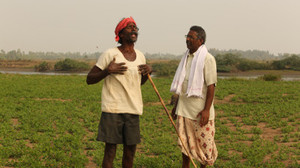Walls and the Tiger
Help us raise awareness on the adverse effects of industrial growth on rural communities.

The documentary Walls and the Tiger is a six-year account of the strife of a rural community in Andhra Pradesh, India, to reverse the merciless grabbing of their fertile land by the government and corporations in the name of “development.” It follows the rural villagers of Kona Forest village, who have been living traditionally for thousands of years, and who have been robbed of their land to build the Kakinada SEZ. Their resistance has been violently suppressed, but so far, they have been able to hold off loosing their land by uniting, cooperating, and not losing faith.
According to the land acquisition laws (which date back to the British presence in India), once the land is taken, government should set up industry and provide employment within 6 years. In the case of the Kakinada SEZ, that six-year period ended in 2012. Therefore, the land should have been returned to the community, which never happened. After Prime Minister Modi’s recent (May 2015) trip to China to dig its financial resources to help India address its $1 trillion infrastructure spending needs, China will set up company in the Kakinada SEZ, built on the land of the community shown in the film. This means that the villagers’ struggle might start all over…
With the film, the directors want to raise global awareness about these human-rights issues, give a voice to people who are fighting for their lives and environment, and bring empowerment to all who view it. “We aim to motivate people to take responsibility as concerned citizens. To provide our comforts and goods, many people are pushed to a corner under the premise of development for all. We are all implicated in the harmful effects of globalized economic activity. And we can all make a difference in the name of humanity.”
We have started a campaign on Kickstarter, where you can donate any amount you can, to help us spread the film and our message as widely as possible. You can find our campaign at https://www.kickstarter.com/projects/652232616/walls-and-the-tiger. We thank you wholeheartedly for your contribution!
More information on the film you can find on our website (http://www.wallsandthetiger.com). For the latest updates, follow us on Facebook or Twitter.
Katrien Curvers and Sushma Kallam, director of the film
(links: https://www.facebook.com/wallsandthetigerfilm, https://twitter.com/WallsAndTiger)